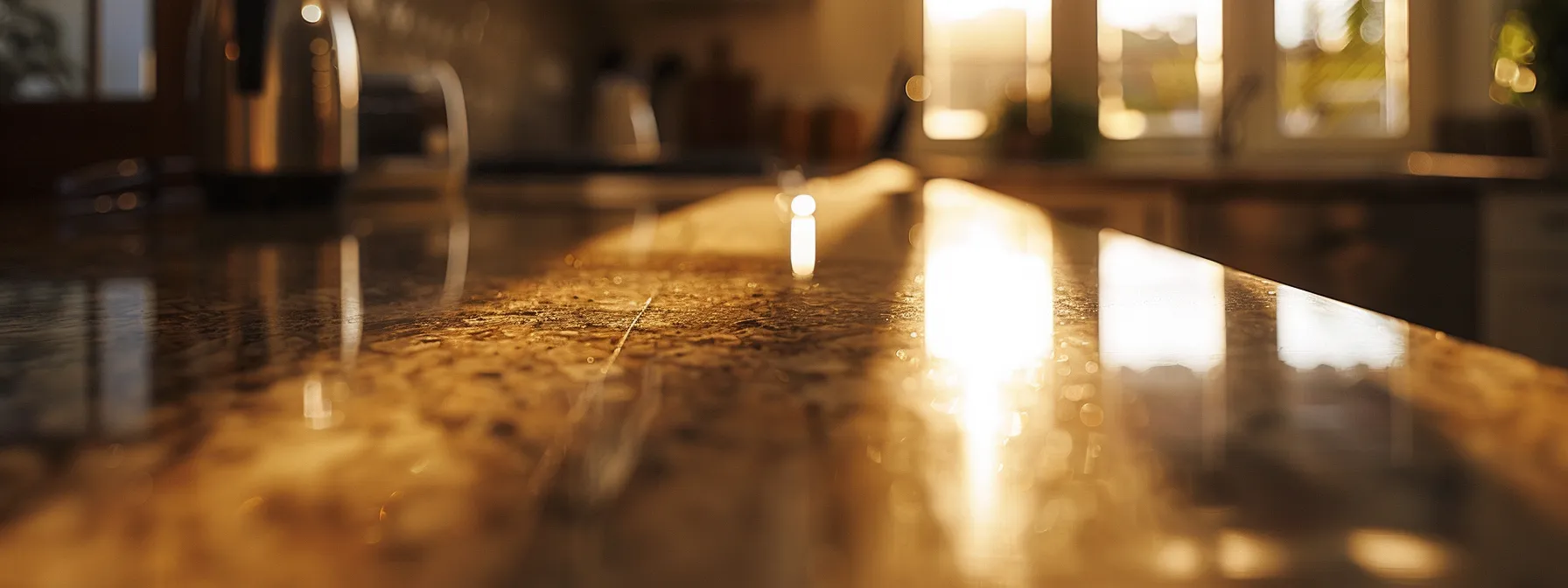
Selecting the right countertop material for your kitchen can feel overwhelming. With so many options like butcher block, engineered stone, clay, and epoxy, how do you choose? This article will guide you through assessing your kitchen needs, exploring the top countertop materials, and matching them to your style. By the end, you will have a clearer understanding of which material fits your lifestyle and budget, helping you make an informed decision that enhances your kitchen’s functionality and beauty.
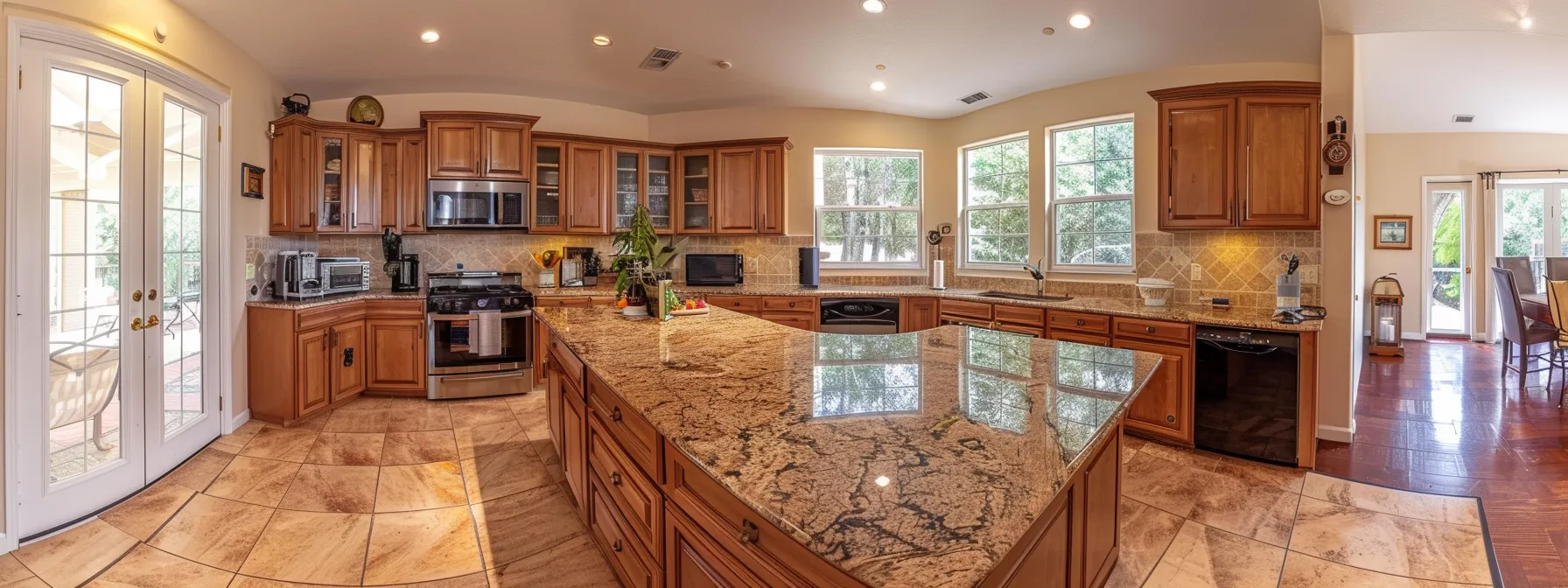
Understanding kitchen needs and lifestyle is essential when selecting the right countertop material. Identifying cooking habits and frequency helps determine durability requirements, while family size and activity levels influence the choice of materials that can withstand wear and abrasion. Additionally, evaluating space and layout constraints ensures that options like granite or porcelain fit seamlessly into the kitchen design.
Identifying cooking habits and frequency is crucial when selecting the right countertop material for a kitchen. For those who cook daily or entertain frequently, durability becomes a top priority. Materials with low porosity, such as quartz or granite, resist stains and are easier to clean, making them ideal for busy kitchens. In contrast, homeowners who cook less often might consider more affordable countertops, like laminate, which can still provide a stylish look without the high maintenance demands.
Additionally, understanding how often food preparation occurs can influence the choice of materials. For example, if a family enjoys baking, a hardwood countertop may be appealing due to its warmth and aesthetic. However, it is essential to consider that hardwood can be prone to wood stain and scratches, requiring regular maintenance. By assessing cooking habits, homeowners can select a countertop that not only fits their lifestyle but also enhances their kitchen’s functionality:
When considering family size and activity levels, the choice of countertop material becomes crucial. Larger families or those with active lifestyles may benefit from durable counter top material options that can withstand daily wear and tear. For instance, materials like resin or quartz are excellent choices as they resist bacteria and are easy to clean, making them ideal for busy kitchens where hygiene is a priority.
Additionally, families that enjoy cooking together or frequently host gatherings should consider the maintenance needs of their countertops. Maple, while beautiful and warm, requires regular treatment with mineral oil to maintain its appearance and prevent bacteria buildup. Understanding the dynamics of family life can guide homeowners in selecting a countertop that not only meets aesthetic preferences but also supports their daily activities effectively.
Evaluating space and layout constraints is vital when selecting countertop material options for a kitchen. Homeowners should measure their kitchen cabinet dimensions and consider the overall design to ensure that high-quality countertops fit seamlessly into the space. For instance, concrete countertops can be customized to match unique layouts, providing a modern aesthetic while maximizing functionality.
Additionally, understanding the kitchen’s flow and how it interacts with other areas can influence the choice of materials. For outdoor kitchens, selecting the best outdoor countertop material is essential for durability and weather resistance. By assessing these factors, homeowners can make informed decisions that enhance both the beauty and practicality of their kitchen environment.
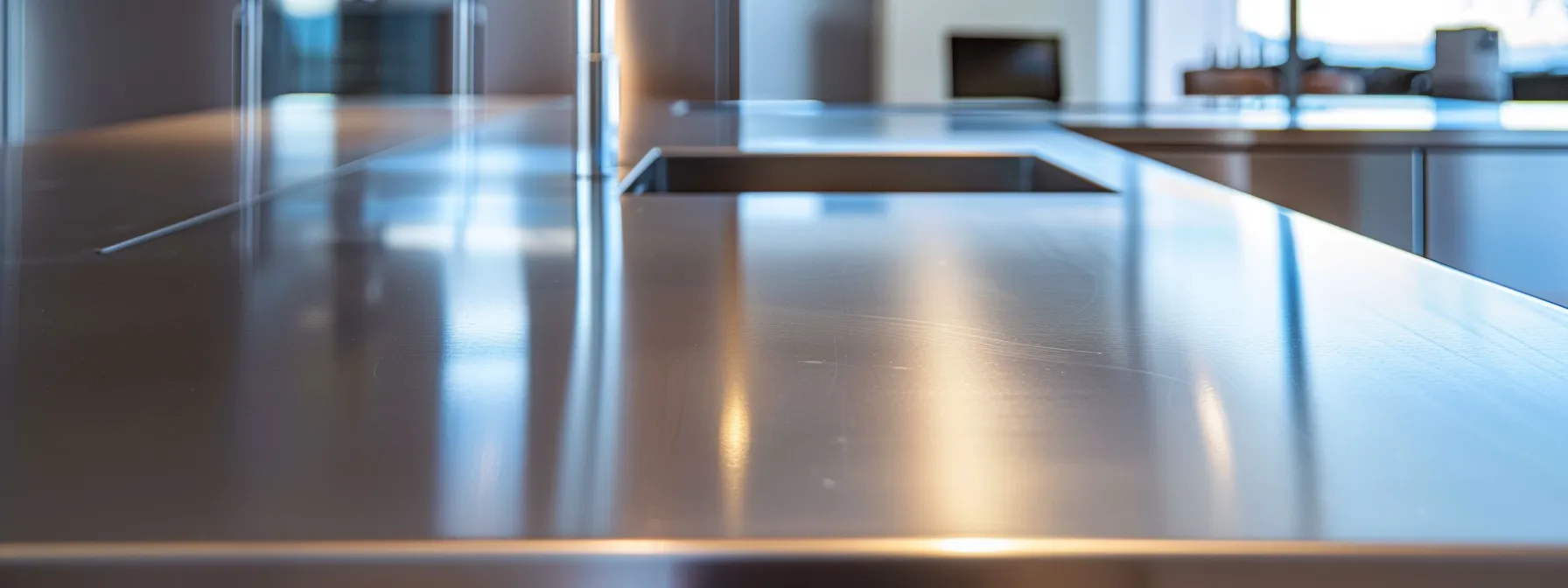
When selecting the right countertop material for a kitchen, homeowners should consider various options that cater to their needs. The durability of granite and quartz offers resistance to wear and tear, while the elegance of marble and soapstone adds a touch of sophistication. Laminate and solid-surface options provide versatility, and wood or butcher block surfaces bring warmth. Lastly, stainless steel and concrete present a modern appeal, making them suitable for contemporary renovations and home improvement projects.
Granite and quartz are two of the most durable countertop materials available, making them ideal choices for busy kitchens. Granite, a natural stone, is highly resistant to scratches and heat, which is essential for cooking environments where hot pots and pans are frequently placed on the surface. To maintain its durability, homeowners should apply a sealant to protect against liquid spills and prevent mold growth, ensuring the countertop remains in excellent condition over time.
Quartz, on the other hand, is engineered from natural stone and resin, providing a non-porous surface that resists stains and bacteria. This feature is particularly beneficial for families who cook often, as it simplifies cleanup and reduces the risk of mold developing in the seams. Both materials offer a combination of beauty and functionality, making them suitable for any kitchen design while meeting the demands of everyday cooking.
Marble and soapstone are two elegant choices for kitchen countertops that can elevate the overall aesthetic of any space. Marble, known for its stunning veining and luxurious appearance, is often favored in high-end kitchen designs. However, it is essential to consider that marble is more porous than other materials, which may require regular sealing to prevent stains from food and liquids. Soapstone, on the other hand, offers a unique charm with its soft feel and natural variations in color. It is highly resistant to heat and stains, making it a practical option for busy kitchens.
When selecting between marble and soapstone, homeowners should also think about maintenance and installation. For instance, while both materials can be installed using mortar and grout, soapstone typically requires less upkeep than marble. Homeowners may appreciate the durability of soapstone, especially in environments where hot pots and pans are frequently placed on the surface. Ultimately, choosing the right material depends on personal style and practical needs:
Laminate and solid-surface options are among the best countertop materials for homeowners seeking versatility and affordability. Laminate countertops come in a wide range of colors and patterns, allowing for creative designs that can mimic the look of more expensive materials like quartzite or cement. This makes laminate an attractive choice for those who want a stylish kitchen without the high costs associated with natural stone.
Solid-surface countertops, on the other hand, offer a seamless appearance and are easy to maintain, making them ideal for busy kitchens. These surfaces can be shaped and molded to fit unique designs, providing flexibility in kitchen layouts. Additionally, solid-surface materials are resistant to stains and scratches, ensuring they remain functional and visually appealing over time. For homeowners looking for the best types of countertops that balance aesthetics and practicality, laminate and solid-surface options are excellent choices.
Wood and butcher block surfaces bring a unique warmth and charm to any kitchen, making them a popular choice among homeowners. Oak, in particular, is favored for its durability and beautiful grain, which can enhance the overall aesthetic of the space. While these materials offer a cozy feel, it is important to consider their maintenance needs, as they can be susceptible to etching and scratches, especially around the sink area where water exposure is common.
For those looking to maintain the beauty of wood countertops, using the best countertop epoxy can provide a protective layer that helps resist stains and damage. This option is especially beneficial for families who enjoy cooking and entertaining, as it allows for a functional yet stylish workspace. Additionally, wood surfaces can be a great choice for an outdoor kitchen, provided they are treated properly to withstand the elements, ensuring they remain a stunning focal point for gatherings.
Stainless steel and concrete are increasingly popular choices for modern kitchen countertops, offering a sleek and industrial aesthetic that appeals to contemporary homeowners. Stainless steel is known for its durability and resistance to heat and stains, making it one of the best countertops for busy kitchens. Its non-porous surface is easy to clean, which is essential for maintaining hygiene in food preparation areas.
Concrete countertops provide a unique, customizable option that can be tailored to fit any kitchen design. They can be mixed with minerals or pigments to create a variety of colors and textures, allowing homeowners to achieve a personalized look. While concrete requires sealing to prevent stains, its strength and versatility make it a practical choice for those looking to combine style with functionality. Homeowners should consider these factors when selecting the best countertops for their kitchen needs:
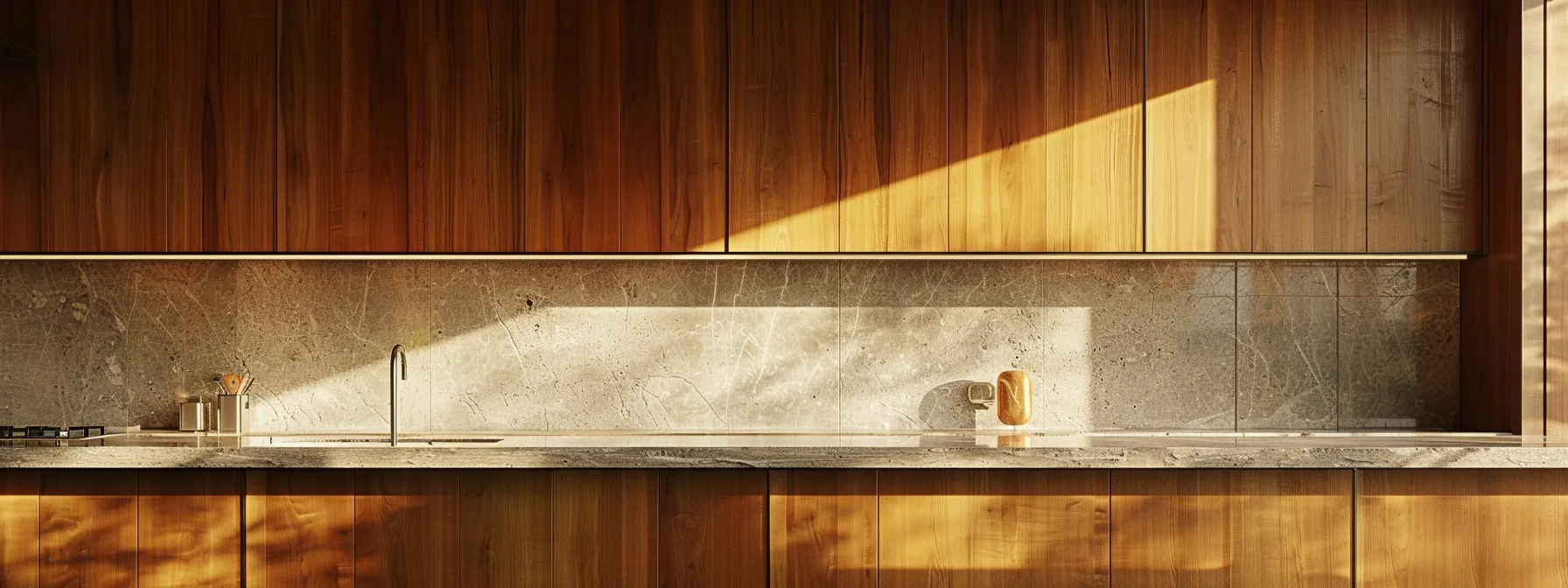
When selecting the right countertop material for a kitchen remodel, it is essential to compare various features that impact functionality and aesthetics. Assessing durability and longevity helps identify the most durable countertops, while understanding maintenance requirements ensures ease of care. Evaluating heat and scratch resistance is crucial for busy kitchens, and considering hygiene and bacterial resistance protects family health. Additionally, examining environmental impact and sustainability can guide homeowners toward the most affordable countertop options that align with their values.
When assessing durability and longevity in countertop materials, homeowners should consider how different surfaces withstand daily use. For instance, stainless steel countertops are known for their resilience against scratches and heat, making them ideal for busy kitchens. In contrast, materials like wood may require more maintenance, especially if used as a cutting board, as they can be prone to scratches and stains over time.
Another important factor is the impact of pigments and finishes on durability. Some countertops, such as quartz, incorporate pigments that enhance their appearance while providing a non-porous surface resistant to stains and bacteria. Homeowners should evaluate these features to ensure their chosen countertop not only meets aesthetic preferences but also stands the test of time in a functional kitchen environment:
Understanding maintenance requirements is crucial when selecting a countertop material for a kitchen. For instance, marble countertops, while elegant, require regular sealing to prevent stains and maintain their beauty. Homeowners should also consider that wood surfaces need periodic oil treatments to preserve their appearance and prevent the development of a patina, which can enhance their character but may not be desired by everyone.
Solid-surface countertops offer a more straightforward maintenance routine, as they are resistant to stains and scratches, making them ideal for busy kitchens. Homeowners can easily clean these surfaces with mild soap and water, ensuring they remain functional and visually appealing over time. By evaluating the maintenance needs of each material, homeowners can choose a countertop that aligns with their lifestyle and cooking habits.
Evaluating heat and scratch resistance is crucial when selecting a countertop material for a kitchen. Homeowners who frequently cook need surfaces that can withstand high temperatures and resist scratches from utensils and cookware. For instance, materials like granite and quartz excel in these areas, providing durability that meets the demands of a busy kitchen environment. Their ability to resist heat and scratches ensures that they maintain their appearance and functionality over time, making them ideal choices for those who prioritize both style and practicality.
In contrast, some materials, such as wood, may require more careful handling to avoid damage from heat and scratches. While wood countertops offer warmth and charm, they can be susceptible to burns and cuts, necessitating regular maintenance to keep them looking their best. Homeowners should consider their cooking habits and the level of care they are willing to invest when choosing a countertop material. By understanding the heat and scratch resistance of various options, they can select a surface that aligns with their lifestyle and enhances their kitchen experience.
When selecting a countertop material, hygiene and bacterial resistance are critical factors to consider, especially for families who prioritize food safety. Materials like quartz and stainless steel are non-porous, which means they do not harbor bacteria or absorb liquids, making them easy to clean and maintain. This feature is particularly beneficial in busy kitchens where spills and food preparation occur frequently, ensuring a safe environment for cooking and dining.
Homeowners should also be aware that some materials, such as wood, can be more susceptible to bacteria if not properly maintained. While wood countertops can add warmth to a kitchen, they require regular oil treatments and careful cleaning to prevent bacteria buildup. By understanding the hygiene properties of various countertop materials, homeowners can make informed choices that align with their health and safety needs in the kitchen.
When selecting a countertop material, homeowners should consider the environmental impact and sustainability of their choices. Materials like recycled glass and bamboo are excellent options, as they are sourced from renewable resources and reduce waste. By opting for these eco-friendly materials, homeowners can create a beautiful kitchen while also contributing to a healthier planet.
Additionally, understanding the manufacturing processes of countertop materials is essential for making informed decisions. For instance, quartz countertops are often made from natural stone and resin, which can have varying environmental footprints depending on the sourcing and production methods. Homeowners should seek out suppliers who prioritize sustainable practices, ensuring that their countertop choices align with their values and support a more sustainable future.
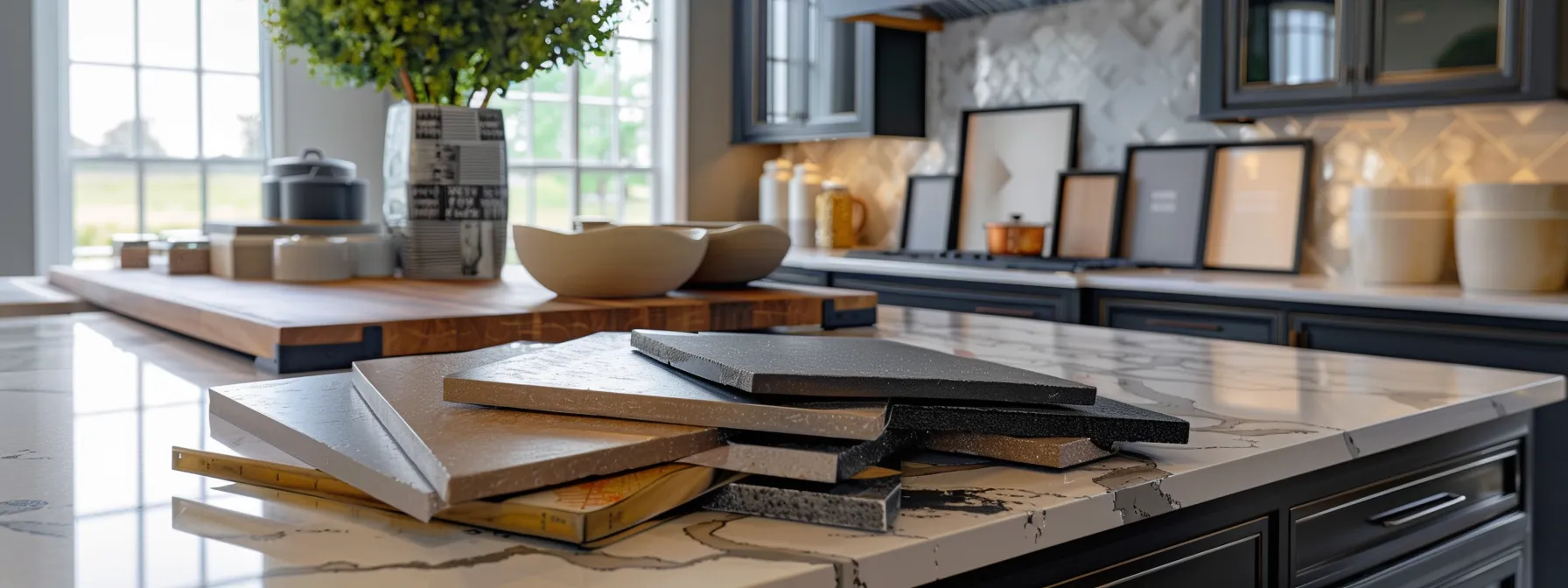
When selecting the right countertop material for a kitchen, homeowners must carefully budget for their investment. This involves analyzing material costs and value, factoring in installation expenses, and weighing long-term maintenance costs. Additionally, exploring financing and budget-friendly options can help ensure that the chosen countertop aligns with both aesthetic desires and financial realities.
When analyzing material costs and value for kitchen countertops, homeowners should consider both the initial purchase price and the long-term benefits of each material. For instance, while granite and quartz may have a higher upfront cost, their durability and low maintenance requirements can lead to savings over time. Understanding the total cost of ownership helps homeowners make informed decisions that align with their budget and lifestyle needs.
Additionally, it is essential to factor in installation expenses, as these can vary significantly based on the material chosen. For example, laminate countertops typically have lower installation costs compared to natural stone options, which may require professional installation due to their weight and complexity. By evaluating both material and installation costs, homeowners can select a countertop that not only fits their aesthetic preferences but also provides the best value for their investment.
When budgeting for a kitchen countertop, it is essential to factor in installation expenses, as these can significantly impact the overall cost. Different materials have varying installation requirements; for instance, laminate countertops are generally easier and less expensive to install compared to heavier options like granite or quartz, which may require professional installation. Homeowners should obtain quotes from contractors to understand the labor costs associated with their chosen material, ensuring they can plan their budget effectively.
Additionally, some countertop materials may require special tools or techniques for installation, which can further increase costs. For example, concrete countertops often need custom molds and professional finishing, adding to the overall expense. By considering these factors, homeowners can make informed decisions that align their countertop choices with their financial plans and avoid unexpected costs during the renovation process:
When selecting a countertop material, homeowners must consider long-term maintenance costs as part of their overall budget. Some materials, like granite and quartz, require minimal upkeep, which can save money over time. In contrast, options such as wood or marble may need regular sealing or oil treatments, leading to higher maintenance expenses that can add up significantly.
Understanding the maintenance requirements of each countertop material helps homeowners make informed decisions. For example, while laminate countertops are affordable and easy to clean, they may not offer the same longevity as more durable options. By weighing these long-term maintenance costs against initial material prices, homeowners can choose a countertop that fits their budget and lifestyle effectively:
Homeowners looking to budget for their kitchen countertops can explore various financing options to make their investment more manageable. Many suppliers offer financing plans that allow homeowners to pay for their countertops over time, making it easier to afford high-quality materials like granite or quartz. Additionally, some retailers provide promotional discounts or seasonal sales, which can significantly reduce costs and help homeowners stay within their budget.
Another effective strategy is to consider budget-friendly countertop materials that still deliver style and functionality. Options like laminate or solid-surface countertops can provide an attractive look without the hefty price tag associated with natural stone. By prioritizing needs and exploring different materials, homeowners can find solutions that meet their aesthetic desires while keeping financial constraints in mind:
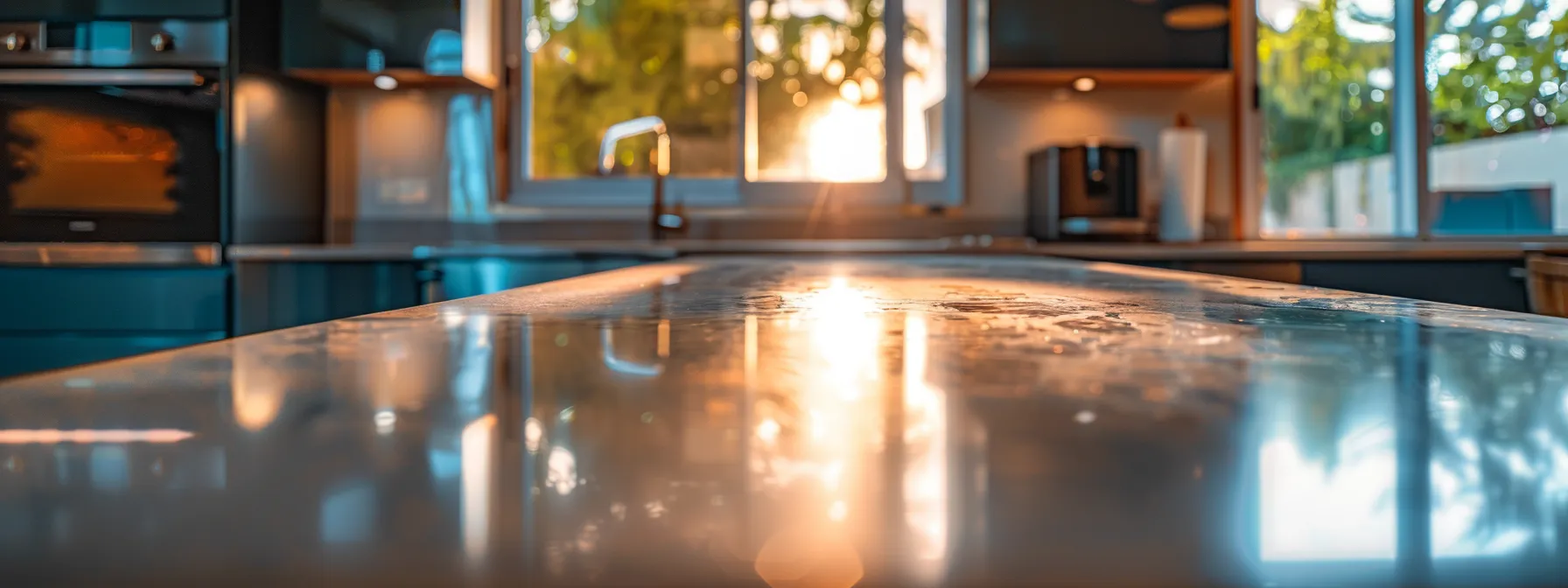
Choosing the right countertop material involves aligning with contemporary designs, complementing traditional aesthetics, and enhancing rustic or country kitchens. Homeowners should also consider how color and texture harmony can elevate their kitchen’s overall look. Each of these aspects plays a crucial role in ensuring that the selected countertop not only meets functional needs but also enhances the kitchen’s style.
When aligning countertops with contemporary designs, homeowners should consider materials that reflect modern aesthetics. Options like quartz and stainless steel are popular choices due to their sleek appearance and durability. These materials not only enhance the kitchen’s visual appeal but also provide practical benefits, such as easy maintenance and resistance to stains, making them ideal for busy households.
In addition to material selection, color and texture play a significant role in achieving a contemporary look. Neutral tones, such as whites, grays, and blacks, can create a clean and sophisticated environment. Homeowners can also incorporate textures, like matte finishes or polished surfaces, to add depth and interest to their kitchen design. By thoughtfully selecting countertops that align with contemporary styles, homeowners can create a space that is both functional and visually striking:
To complement traditional aesthetics in a kitchen, homeowners should consider materials that evoke warmth and timelessness. Options like natural stone, such as granite or marble, can enhance the classic look while providing durability. These materials not only add elegance but also blend seamlessly with traditional cabinetry and fixtures, creating a cohesive design that feels inviting and functional.
Another excellent choice for traditional kitchens is wood or butcher block countertops, which bring a rustic charm to the space. These surfaces can be stained or finished to match the cabinetry, providing a unified appearance. Homeowners should also consider the maintenance needs of wood, as regular oil treatments can help preserve its beauty and functionality over time. By selecting the right materials, homeowners can achieve a kitchen that reflects their style while meeting practical needs:
To enhance rustic and country kitchens, homeowners should consider materials that embody warmth and natural beauty. Options like reclaimed wood or butcher block countertops can add a charming, homey feel, making the kitchen a welcoming space for family and friends. These materials not only provide a cozy aesthetic but also offer durability, ensuring they withstand the rigors of daily use.
Additionally, natural stone countertops, such as granite or soapstone, can complement rustic designs beautifully. Their unique textures and earthy tones blend seamlessly with traditional cabinetry and farmhouse decor. By selecting the right countertop material, homeowners can create a kitchen that reflects their style while remaining functional and inviting:
Incorporating color and texture harmony in kitchen design is essential for creating a cohesive and inviting space. Homeowners should consider how the countertop material complements the cabinetry, flooring, and overall decor. For instance, pairing a warm wood countertop with soft white cabinetry can enhance a rustic aesthetic, while a sleek quartz surface in a bold color can add a modern touch to a contemporary kitchen. This thoughtful approach ensures that the kitchen not only looks appealing but also feels harmonious and well-planned.
Texture also plays a significant role in achieving balance within the kitchen. A combination of smooth and textured surfaces can create visual interest and depth. For example, a polished granite countertop can be beautifully contrasted with a matte backsplash, adding dimension to the design. By carefully selecting countertop materials that align with the kitchen’s color palette and texture, homeowners can create a space that is both functional and aesthetically pleasing, ultimately enhancing their cooking and entertaining experience.
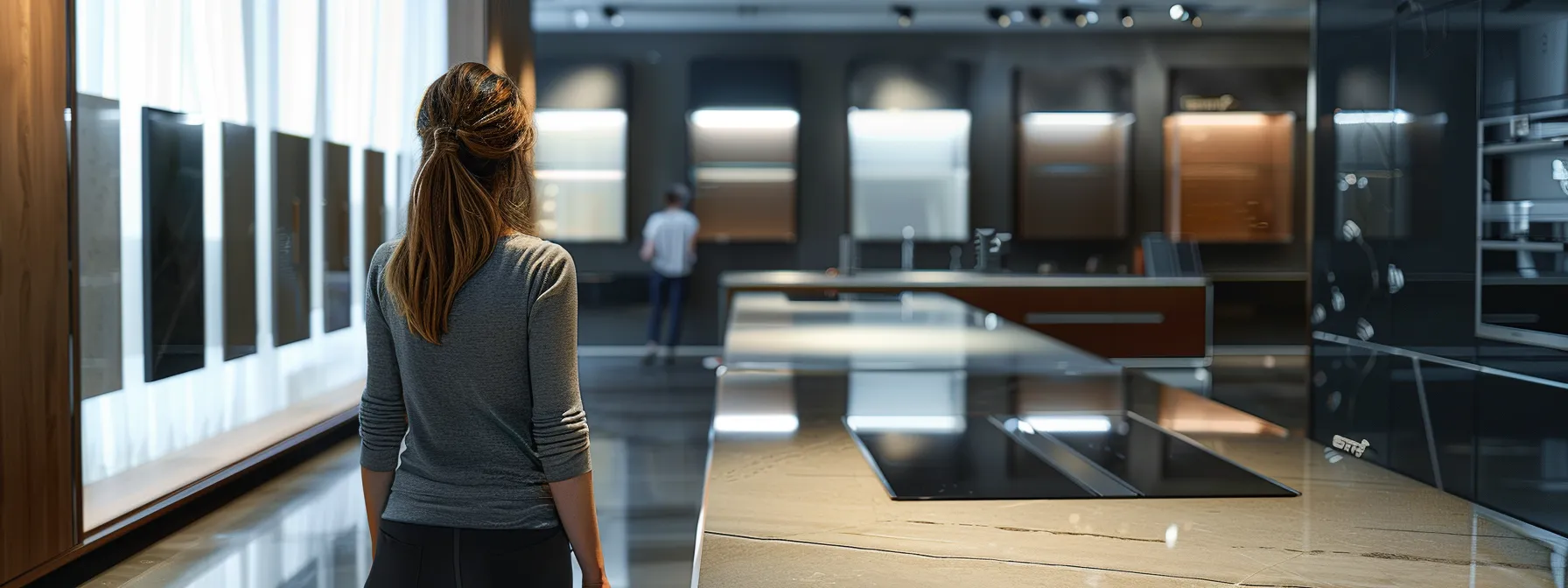
Making the final selection for kitchen countertops involves several key steps. Homeowners should consult with kitchen design professionals to gain expert insights tailored to their needs. Reviewing samples and visiting showrooms allows for a hands-on experience with materials. Reading reviews and gathering testimonials provides valuable feedback from other homeowners. Finally, planning for installation and aftercare ensures a smooth transition to the new countertop.
Consulting with kitchen design professionals is a crucial step in selecting the right countertop material for a kitchen. These experts bring valuable insights into the latest trends, materials, and design principles that can help homeowners make informed decisions. By discussing specific needs, such as cooking habits and aesthetic preferences, homeowners can receive tailored recommendations that align with their lifestyle and budget.
Additionally, kitchen design professionals can provide practical examples of how different countertop materials perform in real-life settings. They can share experiences from previous projects, highlighting the pros and cons of various options. This firsthand expertise not only helps homeowners visualize their choices but also ensures that the selected countertop will meet both functional and aesthetic requirements, ultimately enhancing the overall kitchen experience.
Reviewing samples and visiting showrooms is a vital step in selecting the right countertop material for a kitchen. Homeowners can gain a tangible sense of how different materials look and feel in person, which is essential for making an informed decision. For instance, seeing the unique veining in granite or the smooth finish of quartz can help homeowners visualize how these options will complement their kitchen design.
Additionally, visiting showrooms allows homeowners to consult with knowledgeable staff who can provide insights into the durability and maintenance of various countertop materials. This firsthand expertise can address specific concerns, such as how well a material holds up against daily wear and tear or its resistance to stains. Engaging with professionals in a showroom setting can empower homeowners to choose a countertop that not only meets their aesthetic preferences but also aligns with their lifestyle needs.
Reading reviews and gathering testimonials is an essential step in selecting the right countertop material for a kitchen. Homeowners can gain valuable insights from others who have already made similar choices, helping them understand the pros and cons of various materials. For instance, reviews may highlight the durability of quartz or the maintenance needs of marble, allowing potential buyers to make informed decisions based on real experiences.
Additionally, testimonials can provide reassurance about the quality and performance of specific countertop options. Homeowners often share their satisfaction with the aesthetic appeal and functionality of their chosen materials, which can guide others in their selection process. By considering feedback from previous customers, homeowners can feel more confident in their countertop choices, ensuring that they align with their lifestyle and kitchen needs.
Planning for installation is a critical step in selecting the right countertop material for a kitchen. Homeowners should coordinate with professional installers to ensure that the chosen material is handled correctly, as some options, like granite and quartz, require specialized techniques due to their weight and fragility. Proper planning includes scheduling the installation at a convenient time and preparing the kitchen space to minimize disruption during the process.
Aftercare is equally important to maintain the beauty and functionality of the new countertops. Homeowners should familiarize themselves with the specific maintenance requirements of their chosen material, such as sealing granite or regular cleaning for quartz. By following these guidelines, they can ensure their countertops remain in excellent condition, enhancing the kitchen’s overall appeal and longevity.
Selecting the right countertop material for your kitchen is crucial for both functionality and aesthetics. Homeowners must consider their cooking habits, family size, and space constraints to choose a surface that meets their needs. Durable materials like granite and quartz offer long-lasting performance, while options like laminate provide affordability without sacrificing style. By making informed decisions, homeowners can create a beautiful and practical kitchen that enhances their daily living experience.
